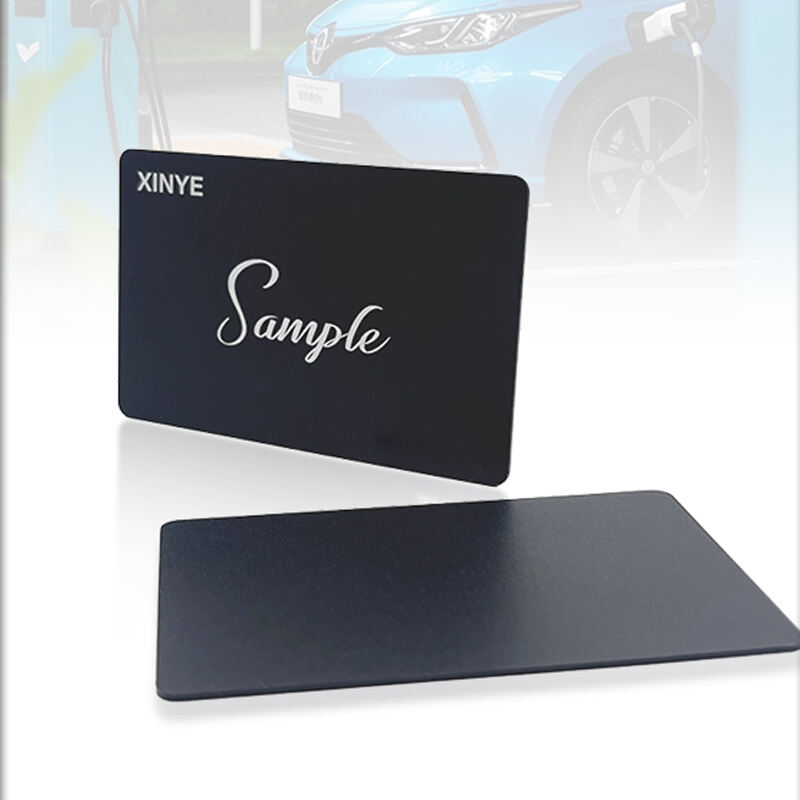In recent years, the level of intelligence in electric vehicles (EVs) has steadily increased, and NFC car key cards are gradually replacing traditional keys as a new unlocking method. NFC key cards are becoming a critical technology for smart mobility. Compared to traditional physical keys or Bluetooth connections, users only need to bring the card close to the sensing area to unlock the vehicle. With its high security, convenience and low cost benefits, NFC key cards are being widely adopted by many EV brands.
NFC key cards are based on Near Field Communication (NFC) technology, which works in a similar way to contactless payment cards. When an NFC key card is brought close to the vehicle's sensing area (typically located on the B-pillar or centre console), the chip initiates an encrypted data exchange with the vehicle's NFC module. Upon successful verification, the vehicle can be unlocked or started.

Advantages of NFC key cards compared to Bluetooth keys
High Security: Uses dynamic encryption technology to prevent signal interception and duplication.
No Battery Dependence: Does not require recharging, ensuring long-term stable use.
Strong Compatibility: Supports smartphone NFC functions, providing a backup unlocking option.
Applications of NFC Key Cards in Electric Vehicles
Vehicle owners can pair NFC key cards with their smartphone's NFC capability to enable "seamless unlocking". In addition, some automakers' NFC key cards support multi-user permission management, such as temporarily authorising friends or to use the vehicle without the risk of losing a physical key.
Beyond vehicle unlocking, NFC key cards can also automatically adjust seat positions, activate air conditioning and even interact with smart home devices. In this "fully connected scenario" model, NFC key cards act as a central hub for smart mobility. In the future, NFC key cards can be integrated with smart cities, charging stations and other scenarios to provide a 'one card for all' travel experience.
But in practical applications, the technical pain points of NFC cards have also been exposed. Market research shows that approximately 23% of NFC key card failures result from users placing the card alongside their phone on a vehicle’s wireless charging pad, causing the card’s chip to overheat and become damaged due to electromagnetic interference. This industry pain point significantly affects user experience and increases after-sales costs.
Guangdong Xinye Intelligent Label Co., Ltd., a leading smart card manufacturer in China, promptly initiated a specialized R&D effort to overcome the electromagnetic shielding limitations of traditional NFC cards. Through material selection, structural optimization, and extreme environment testing, the company successfully developed an interference-resistant NFC key card for vehicles with proprietary intellectual property rights. This product has also passed the IATF 16949 quality system certification for the automotive industry.

Below is a comparison test and performance verification data between standard NFC key cards and Xinye's optimised NFC key cards:
|
Test Metric |
Standard NFC Card |
Xinye Optimized NFC Card |
|
Initial Read Success Rate |
100% |
100% |
|
Chip Condition After 15s |
Bulging, Failed |
No Change |
|
48-Hour Continuous Test |
Unusable |
Fully Functional |
|
Extreme Temp (-40~85°C) |
Failed |
Passed |
|
Bend Test (500 Times) |
Cracked |
No Damage |
Guangdong Xinye Intelligent Label Co., Ltd.'s anti-burn NFC key card for vehicles has successfully addressed a major usability pain point in the EV industry. Looking ahead, Xinye will continue to refine and explore the UWB/NFC dual-mode key card technology, driving the intelligent automotive industry into an era of "zero failure keys".